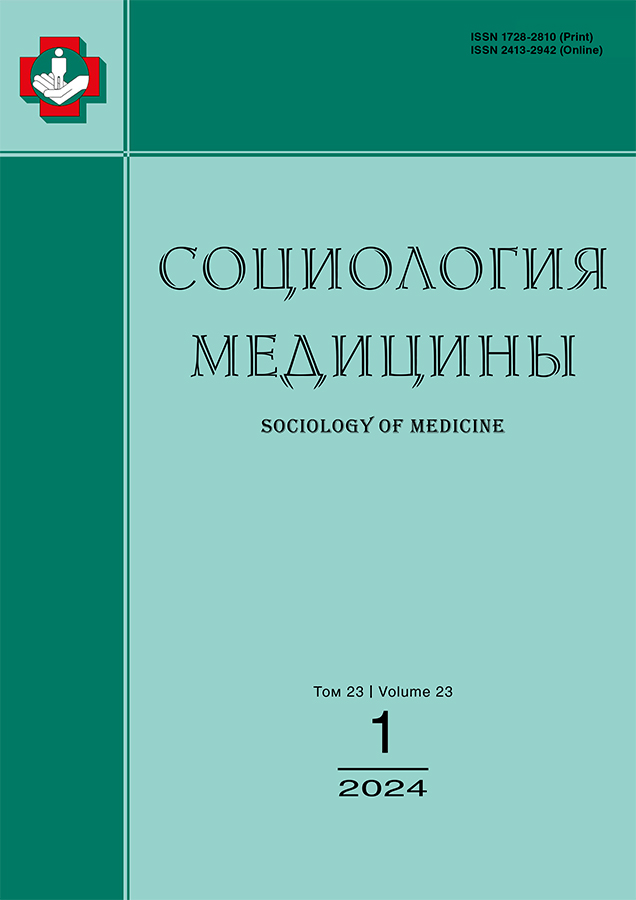Mentoring in the healthcare system: problems and prospects
- Authors: Gareeva I.A.1, Litvintseva S.A.2
-
Affiliations:
- Pacific State University
- Far Eastern State Medical University
- Issue: Vol 23, No 1 (2024)
- Pages: 15-22
- Section: MEDICAL SOCIOLOGICAL STUDIES
- URL: https://rjsocmed.com/1728-2810/article/view/629869
- DOI: https://doi.org/10.17816/socm629869
- ID: 629869
Cite item
Abstract
BACKGROUND: During the rapid development of science and medical technologies, the professional environment faces the urgent task of finding mechanisms to increase the professional competencies and practical skills of medical specialists in the process of professional socialization. The sociological study conducted by the authors focused on identifying factors of successful/unsuccessful professional socialization of young medical specialists, including mentoring.
AIM: Determining the role of the mentoring institution as a factor influencing the success/failure of professional socialization of medical specialists.
METHODS: A survey was conducted among clinical residents of the Far Eastern State Medical University. A total of 184 respondents were interviewed using a Google form questionnaire. Methods of analysis, comparison, generalization of obtained data, analysis of regulatory documents, survey results, and secondary data from sociological research were used. Descriptive statistics methods provided by SPSS and EXCEL software were used at the level of data processing and work with source material.
RESULTS: The sociological study identified the most pressing problems of introducing and implementing mentoring practices in the healthcare system. It also determined the role of the mentoring institution as a socializing factor influencing the success/failure of professional socialization of medical specialists. The study formulates tasks for further research into the process of professional socialization of medical specialists, focusing on identifying positive and destructive factors and the role of socialization institutions.
CONCLUSION: Problems in implementing mentoring practices in healthcare relate to the low mentoring activity of practicing medical specialists. A special need for mentoring practices was identified at the stage of postgraduate training (clinical residency) by 83% of respondents and at the stage of starting independent professional work by 61% of respondents. Respondents expressed a positive attitude towards mentoring in healthcare: 90% indicated that having a mentor when obtaining a medical specialty is mandatory.
Full Text
About the authors
Irina A. Gareeva
Pacific State University
Author for correspondence.
Email: gar_ia@mail.ru
ORCID iD: 0000-0002-3764-7073
SPIN-code: 1043-7785
Dr. Sci. (Sociology)
Russian Federation, KhabarovskSvetlana A. Litvintseva
Far Eastern State Medical University
Email: svetlana-litvinceva@mail.ru
ORCID iD: 0009-0004-3576-1165
SPIN-code: 3898-9266
Cand. Sci. (Sociology)
Russian Federation, KhabarovskReferences
- Pirogov NI. Questions of life. The diary of an old doctor. Tyurikov AD, compiler. Ivanovo; 2008. (In Russ.)
- The concept of mentoring development in the Russian Federation. In: Consultant Plus [Internet]. Moscow: Russian Academy of Education; 2023 [cited 2024 Feb 23]. Available from: https://www.consultant.ru/cons/cgi/online.cgi?req=doc&base=EXP&n=831223#sutRGJU29kacFuIz1 (In Russ.)
- Pavlov VN, Tsyglin AA Rakhmatullina IR, et al. Medical University of the XXI century: unity of traditions and innovations. Higher education today. 2018(4):40–50. (In Russ.) EDN: YVJETI doi: 10.25586/RNU.HET.18.04.P.40
- Efimov VN, Efimova IN, Rikhvitskaya TV. On the issue of experience in building an education system in traditional medicine. Electronic scientific and educational bulletin “Health and education in the 21st century”. 2006;8(6):260–261. (In Russ.) EDN: UADOWZ
- Agranovich NV, Knyshova SA. Studying the motivation of educational activity of students of medical universities and its role in the formation of readiness for a future profession. Modern problems of science and education. 2015(2–2). (In Russ.) EDN: UZJFZZ
- Al Shawwa LA. The establishment and roles of the Medical Education Department in the faculty of Medicine, King Abdul Aziz University, Jeddah Saudi Arabia. Oman Med J. 2012;27(1):4–9. doi: 10.5001/omj.2012.02
- Mamedova GB, Meldebekova SU, Mambetova GK, et al. Determination of key competencies of a general practitioner. Young scientist. 2015(11):676–679. (In Russ.) EDN: TWRFOH
- Schwarz G, Cavene LA. Outcome Based Education and Curriculum Change: Advocacy, Practice and Critique. J Curric Superv. 1994(9):326–338.
- Aksenova EI, Burdastova YuV. Mentoring in healthcare: Moscow experience. Moscow Medicine. 2023(4):20–31. (In Russ.) EDN: OJHTHP
- Burdastova YuV. Problems of formalizing the institution of mentoring in healthcare and ways to solve them. Healthcare of the Russian Federation. 2021;65(5):461–466. (In Russ.) EDN: YLBDDN doi: 10.47470/0044-197X-2021-65-5-461-466
- Healthcare of Russia 2021. In: Rosstat [Internet]. Moscow: Federal State Statistics Service; 2021 [cited 2024 Feb 05]. Available from: https://rosstat.gov.ru/storage/mediabank/Zdravoohran-2021.pdf (In Russ.)
- Efremenko VF. Structural factors of migration of the population of the Russian Far East. Power and management in the East of Russia. 2022(3):101–107. (In Russ.) EDN: WLZOHH doi: 10.22394/1818-4049-2022-100-3-101-107
- Motrich EL. Migration in the demographic development of the Russian Far East. Living standards of the population of Russian regions. 2022;18(1):27–40. (In Russ.) EDN: SBQNTL doi: 10.19181/lsprr.2022.18.1.2
- Nenakhova YuS. Formation of the regulatory framework for mentoring in healthcare. Problems of standardization in healthcare. 2021(1–2):3–11. (In Russ.) EDN: YYBLVF doi: 10.26347/1607-2502202101-02003-011
- Prisyazhnaya NV, Vyatkina NYu. Employment of a young medical specialist: levels of manifestation of the problem. Bulletin of the Institute of Sociology. 2023;14(1):101–114. (In Russ.) EDN: GFWFWC doi: 10.19181/vis.2023.14.1.6
- Prisyazhnaya NV, Vyatkina NYu. Readiness of future medical university graduates for professional activities. Saratov Medical Scientific Journal. 2022;18(4):590–595. (In Russ.) EDN: GJEKAU
- Prisyazhnaya NV, Reshetnikov AV. Education in a pandemic: vectors of digital transformation. Sociological Research. 2022(4):149–151. (In Russ.) EDN: IVSVOX doi: 10.31857/S013216250018694-6
- Litvintseva S.A. Professional socialization of medical specialists: a sociological analysis (on the example of the Khabarovsk Territory) [dissertation abstract]. Khabarovsk; 2023. 171 p.
Supplementary files







